

Ethnographers as Writers: Getting Started. Every article, book, or thesis begins with a first word, but getting started feels overwhelming.
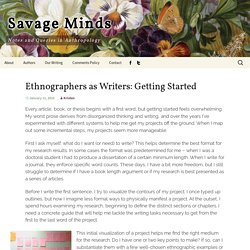
My worst prose derives from disorganized thinking and writing, and over the years I’ve experimented with different systems to help me get my projects off the ground. When I map out some incremental steps, my projects seem more manageable. First I ask myself: what do I want (or need) to write? This helps determine the best format for my research results. In some cases the format was predetermined for me – when I was a doctoral student I had to produce a dissertation of a certain minimum length.
A History of the Modern Fact: Problems of Knowledge in the Sciences of Wealth and Society, Poovey. First Person Ethnography - The Editors' Desk. There’s been a lot of talk among sociologists lately about the status of ethnographic research and knowledge, and writing has been at the center of it.
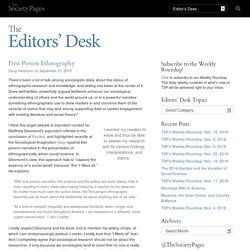
Does well-written, powerfully argued fieldwork enhance our sociological understanding of others and the world around us, or is a powerful narrative something ethnographers use to draw readers in and convince them of the veracity of claims that may lack strong supporting data or careful engagement with existing literature and social theory? I wanted my readers to know and thus be able to assess my research and its various findings, interpretations, and claims. 103 DE VRIES SSofS GB. David Harvey Marx & Capital Lecture 2: Value and Anti-Value. Michel Foucault - The Culture of the Self, First Lecture, Part 1 of 7. Taylor-outline. CHAPTER ONE: The Historical Emergence of the Discourse of Identity, Authenticity, and Recognition (25-37) Thesis of book: Our identity (as individuals or groups) is partly shaped (or misshaped) by recognition (or non-recognition) (25).

Hence "due recognition is not just a courtesy we owe people. It is a vital human need" (26). Ch. One is mainly historical. I. A. B. II. A. B. III. A. B. C. 1. 2. D. 1. 2. IV. A. B. Preface to Frantz Fanon's Wretched of the Earth by Jean-Paul Sartre. Jean-Paul Sartre 1961 Preface to Frantz Fanon’s “Wretched of the Earth” NOT so very long ago, the earth numbered two thousand million inhabitants: five hundred million men, and one thousand five hundred million natives.
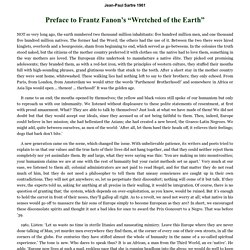
The former had the Word; the others had the use of it. Between the two there were hired kinglets, overlords and a bourgeoisie, sham from beginning to end, which served as go-betweens. In the colonies the truth stood naked, but the citizens of the mother country preferred it with clothes on: the native had to love them, something in the way mothers are loved. It came to an end; the mouths opened by themselves; the yellow and black voices still spoke of our humanism but only to reproach us with our inhumanity.
A new generation came on the scene, which changed the issue. 1961. We must however make one reservation. In short, the Third World finds itself and speaks to itself through his voice. No; he fears nothing. Amazon. New African Histories · Ohio University Press / Swallow Press. The New African Histories series builds on the significant achievements of social historians over the past two decades, while pushing the boundaries of African social history in exciting new directions - theoretically, methodologically and conceptually.
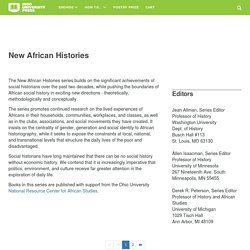
The series promotes continued research on the lived experiences of Africans in their households, communities, workplaces, and classes, as well as in the clubs, associations, and social movements they have created. It insists on the centrality of gender, generation and social identity to African historiography, while it seeks to expose the constraints at local, national, and transnational levels that structure the daily lives of the poor and disadvantaged. Social historians have long maintained that there can be no social history without economic history. We contend that it is increasingly imperative that politics, environment, and culture receive far greater attention in the exploration of daily life.
Editors. The Humanist Imperative in South Africa. The life and work of WEB Du Bois. "Herein lie buried many things which, if read with patience, may show the strange meaning of being black here in the dawning of the 20th century.

This meaning is not without interest to you, Gentle Reader; for the problem of the 20th century is the problem of the colour line". This prophecy may have seemed far-fetched when first published in 1903, but it was to prove more and more compelling as the century advanced. Tiyo Soga - Wikipedia. When Soga’s mother Nosuthu became a Christian she sought and received release from her marriage to Jotello, a head advisor of Chief Ngqika, on the grounds that she wanted her son to be raised a Christian and receive formal education.
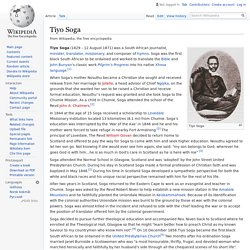
Nosuthu'’s request was granted and she took Soga to the Chumie Mission. As a child in Chumie, Soga attended the school of the Revd John A. Chalmers.[2] Soga attended the Normal School in Glasgow, Scotland and was ‘adopted’ by the John Street United Presbyterian Church. During his stay in Scotland Soga made a formal profession of Christian faith and was baptized in May 1848.[2] During his time in Scotland Soga developed a sympathetic perspective for both the white and black races and his unique racial perspective remained with him for the rest of his life. After two years in Scotland, Soga returned to the Eastern Cape to work as an evangelist and teacher in Chumie. Soga died of tuberculosis in August 1871. Hymns and poetry[edit] References[edit] I Know Why the Caged Bird Sings by Maya Angelou – review. The caged bird "sings of freedom", writes Maya Angelou in her poem "Caged Bird" – a poignant recurring image throughout her work, as she eloquently explores the struggle to become liberated from the shackles of racism and misogyny.

This evocative first volume of her six books of autobiography, originally published in 1969 (1984 in the UK), vividly depicts Angelou's "tender years" from the ages of three to 16, partly in the American south during the depression-wracked 1930s, while also offering timeless insights into the empowering quality of books.
The painful sense of being unwanted haunts her early childhood, for when Maya (then known as Marguerite) is three and her brother Bailey four they are sent to the "musty little town" of segregated Stamps, Arkansas wearing tags on their wrists addressed to "To whom it may concern", dispatched by their parents in California who had decided to end their "calamitous marriage".